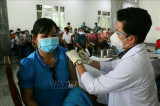Towards a sustainable future
This is the content in the theme of the World Population Day 2022. Responding to the World Population Day, July 11 is an opportunity for mankind to be proud of achievements in the field of population, raising awareness about global population issues.
8 billion people in the world
Doctor Ho Hoang Van, Deputy Director of provincial Sub-Department of Population and Family Planning said that the theme of this year's World Population Day is: "A world of 8 billion people: Towards a resilient future for all - Harnessing opportunities and ensuring choice for all”. This theme comes from the forecast that this year the world’s population will reach about 8 billion people. In-depth analysis of the world’s population, doctor Ho Hoang Van shared that, the world’s population reached 7 billion people last year. This year, the figure will be 8 billion. Some would be surprised at the advances in health sector that have extended life span, reduced maternal and child mortality and developed vaccines in record short time. Others will also be delighted to welcome technological innovations that have made our lives more comfortable, connecting us more than ever. The progress in gender equality has also achieved certain results. However, the progress is not enjoyed by everyone. Women still die in childbirth and gender inequality still exists. Digital technology further leaves women and people in developing countries behind. Over the past time, the Covid-19 vaccine was not distributed evenly. Concerns, challenges: Climate change, violence, discrimination that were raised 11 years ago still exist or even get worse. The world reached an extremely grim milestone in May of this year when more than 100 million people worldwide were forced to flee. It doesn't make any sense if we don't care about those left behind.
(1).jpg) "Strengthening reproductive healthcare for the quality of life and family happiness" is one of the major contents in response to World Population Day, July 11.
"Strengthening reproductive healthcare for the quality of life and family happiness" is one of the major contents in response to World Population Day, July 11.
“The impact on population number has previously been shown to fail, undermining human rights, including reproductive rights when women are forced to have more or fewer children against their will or because they do not have access to information and services to help them make decisions. These are inherently contrary to the spirit of the Action Program of the International Conference on Population and Development (ICPD). For the first time in history, we see large differences in mean age and birth rates between countries. While the population of some countries is aging and about 60% of the world's population lives in countries with fertility rates below the replacement fertility rate of 2.1 children per woman, other countries has a large number of young population and the population is constantly increasing. Reducing the number of population loses humanity", added doctor Ho Hoang Van.
According to the United Nations Economic and Social Commission, “The global population growth will continue declining in the coming decades, but the world’s population is likely to continue increasing by about 20-30% by 2050 compared to 2020”.
Promoting propaganda
Improving the population’s quality is considered as one of the national population and family planning work’s important goals in general and of Binh Duong in particular. In order to achieve this goal under the direction of the Government, provincial sector of population and family planning has advised provincial Party Committee and People's Committee on strengthening the leadership of Party Committees and authorities at all levels for population-family planning. The sector focuses on 7 activities, including renewing the content of propaganda and mobilization on population work, improving the quality of the population and propagandizing the meaning and importance of examination, diagnosis for a number of antenatal and neonatal diseases and health check-up before marriage. Especially, the sector has well implemented mechanisms and policies on population; improved service quality on population; consolidated the organizational apparatus, enhanced the capacity of population cadres at all levels and strengthen the socialization of population services.
Emphasizing activities in the province, doctor Ho Hoang Van said: “In order to effectively implement the work of population and family planning as well as to respond to World Population Day on July 11 this year, provincial sector of population and family planning has cooperated with Binh Duong Newspaper, Radio - Television Station, Radio Stations of districts, towns, cities, communes and townships to strengthen dissemination of information about policies of provincial Party Committee and People's Committee. Especially, the sector has promoted communication about population and development through various types of communication on the internet and social networks (Facebook, Zalo, TikTok, Youtube) guided by the General Department of Population and Family Planning. On the basis of the conditions of each district, town and city, the sector has coordinated to organize such specific activities as organizing meetings, conferences, talk shows, hanging banners, distributing communication products... In addition to promoting communication on the mass media, provincial Sub-Department of Population and Family Planning has deployed the task of hanging banners and slogans in response to the World Population Day, July 11 on the main roads in Thu Dau Mot city.
On this year's World Population Day, Binh Duong's population sector wants families to enhance reproductive healthcare. For those who are about to get married, it is necessary for them to consult and have a health check before marriage for the happy future of each family,” shared doctor Ho Hoang Van, Deputy Director of provincial Sub-Department of Population and Family Planning.
Doctor Ho Hoang Van, Deputy Director of provincial Sub-Department of Family Planning said that the accurate estimate of population trends and reliable forecast of future population changes are necessary and important for the country’s sustainable development. As fertility declines, would-to-be parents worry about how they will provide for a family, find affordable housing or taking maternity leave that could hinder a mother's career path. The increase in fertility is due to their choice or women's lack of knowledge or not being accessed to modern contraceptives.
Reported by Hoang Linh-Hai Yen-Translated by Kim Tin
 Trade unions and companies take good care of workers
Trade unions and companies take good care of workers
 Giving gifts for ethnic minority families with difficult circumstances
Giving gifts for ethnic minority families with difficult circumstances
 Honoring tradition of studiousness in Tan Uyen heroic homeland
Honoring tradition of studiousness in Tan Uyen heroic homeland
 Telecoms service providers invest in 4G, 5G technologies
Telecoms service providers invest in 4G, 5G technologies
 Sentimental land of Binh Duong
Sentimental land of Binh Duong
 Efforts made to care for and retain employees
Efforts made to care for and retain employees
 Housing Law 2023: Abolish regulations on residence conditions when buying or renting social housing
Housing Law 2023: Abolish regulations on residence conditions when buying or renting social housing
 Provincial Charity Club for Children with Cancer launched
Provincial Charity Club for Children with Cancer launched
 VGCL surveys "Better Jobs" program in enterprises
VGCL surveys "Better Jobs" program in enterprises
 Reducing GHG emissions contributes to sustainable development
Reducing GHG emissions contributes to sustainable development




